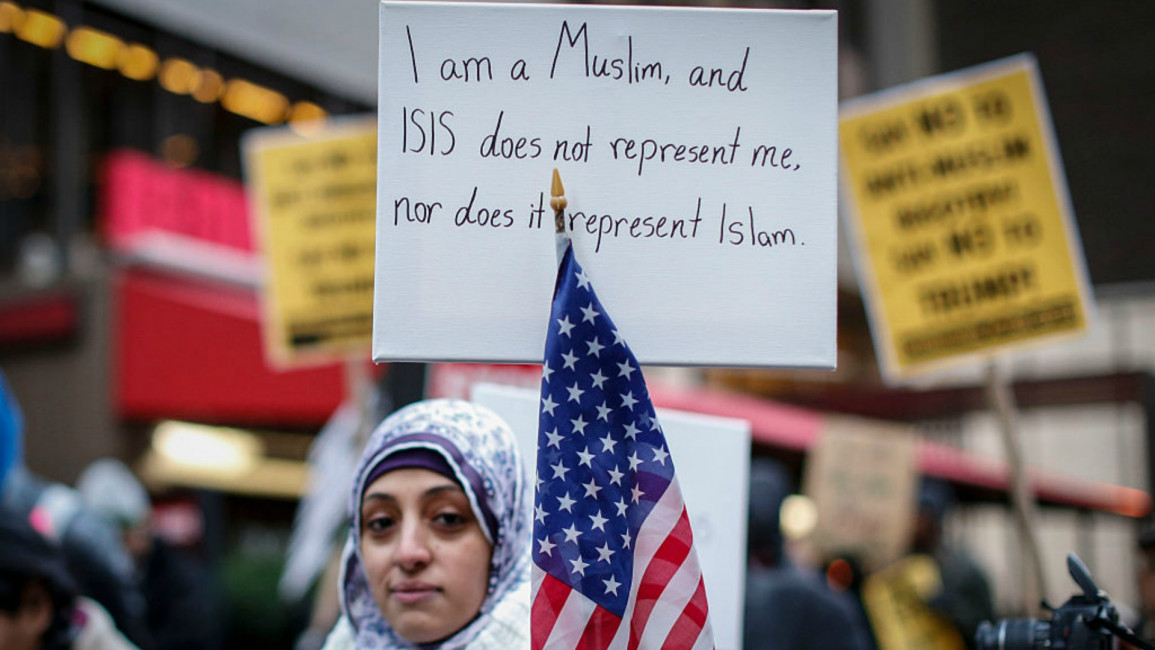
Donald Trump's profiling of Muslims will never work
"And other countries do it; you look at Israel and you look at others and they do it and they do it successfully," said Trump.
There is little to evidence to support the idea that profiling Muslims is a "common sense" technique to root out extremists. Moreover, citing Israel as an example negates the dehumanising effects these techniques have had on Palestinians, and the continued oppression of these people.
Profiling doesn't work
Racial profiling in the US disproportionately targets minorities. One widely studied case is of black motorists who have been shown to be the biggest victims of the practice and excessively singled out compared to white drivers. A New York Times analysis showed that in four states blacks were more than twice as likely to be stopped by traffic police than white males.
Yet the heightened scrutiny does not seem to match the number of crimes committed by black motorists. The Times analysis found that in Chicago blacks were 30 percent less likely to be found with illegal goods compared to whites. The same was true in the other three states, where black drives were found less likely to be found with contraband than whites.
A study by the American Civil Liberties Union (ACLU) Illinois chapter reached similar conclusions. The project looked at over 100,000 stops made in 2013 by the Chicago Police Department and found that blacks were more likely to be stopped than Caucasians; 52 percent in districts that were predominantly white. And like the Times investigation, the ACLU study also found that Caucasians were found to be the biggest offenders when it came to carrying contraband.
In the infamous New York Police Department (NYPD) Stop and Frisk programme implemented after 9/11 to monitor gun and drug possession, it was found that yet again people of colour were the biggest victims (blacks and Latinos specifically) and nine out of ten people apprehended were completely innocent. In a devastating blow to those who supported the initiative, an analysis of 5 million stops revealed that guns were recovered in only 0.02 percent of the cases. Murder rates were also found to have not declined despite Bloomberg's claims that the programme made the city safer.
Profiling Muslims for Terrorism
Since 9/11, Muslims have become the latest minority group to face the unbridled prying of security agencies, which has resulted in deteriorating civil rights for the community while making Muslims far less trustful of these organisations.
According to a report by the Leadership Conference on Civil and Human Rights, terrorism profiling is a "flawed law enforcement tactic that diverts precious anti-terrorism resources" and "alienates potential allies in the anti-terrorism struggle." The main target of anti-terrorism profiling methods is Arab men, assuming a link between men of Arab origin with terrorism, similar to conflating black drivers with carrying illegal goods.
"Racial profiling as a defensive counter-terrorism measure… may well encourage the recruitment of terrorists from outside the core profile," said Professor Bernard Harcourt of University of Chicago Law School. According to Harcourt, the police in New York should not stop their surveillance of the New York Subway system, but should do so "without deploying a racial profile".
The "Shoe Bomber" Richard Reid; John Walker Lindh, a former Taliban soldier; Colleen La Rose, better known as Jihadi Jane; and Timothy McVeigh, mastermind of the Oklahoma bombings in 1995, are a few counter examples that make scrutinising one ethnic group an enormously futile exercise.
The Israeli Example
Trump's advice that the United States should follow Israel's example is probably one of his more troubling statements yet. Aside from the fact that even Israel's extensive profiling habits aren't very effective, they have also helped create support for policies that have oppressed Palestinians for decades.
The situation has led to a letter being signed by 43 Israeli intelligence veterans and current reserve personnel stating their refusal to participate in spying activities on Palestinians. It asserted that the intelligence stored often harmed innocent people which only helped to sow divisions amongst the Palestinian people and "driving parts of the Palestinian society against itself". Furthermore the letter added "we refuse to take part in actions against Palestinians and refuse to continue serving as a tool for deepening military rule in the Occupied Territories".
Hence it is improbable Muslim would be cheerful if Israel's discriminatory policies were a supplement to the US' own problematic relationship with racial profiling; bearing in mind that in addition to airport security, nowadays their fellow passengers are reporting them for speaking Arabic. This has resulted from years of false propaganda and useless security measures that have gripped the American nation in perpetual panic, while minorities suffer the brunt of these fears.
Usaid Siddiqui is a Canadian freelance writer. He has written for PolicyMic, Aslan Media, Al Jazeera America and Mondoweiss on current affairs. Follow him on Twitter: @UsaidMuneeb16
Opinions expressed in this article remain those of the author and do not necessarily represent those of The New Arab, its editorial board or staff.




